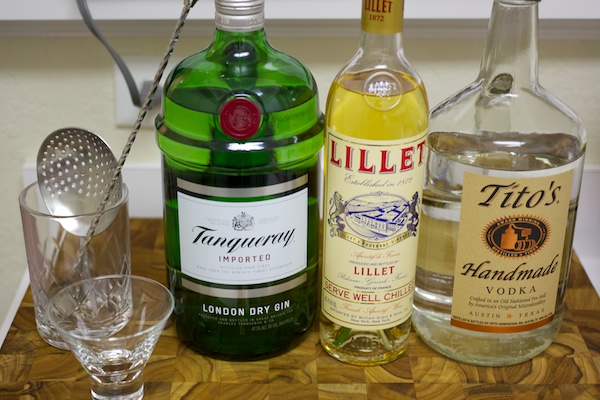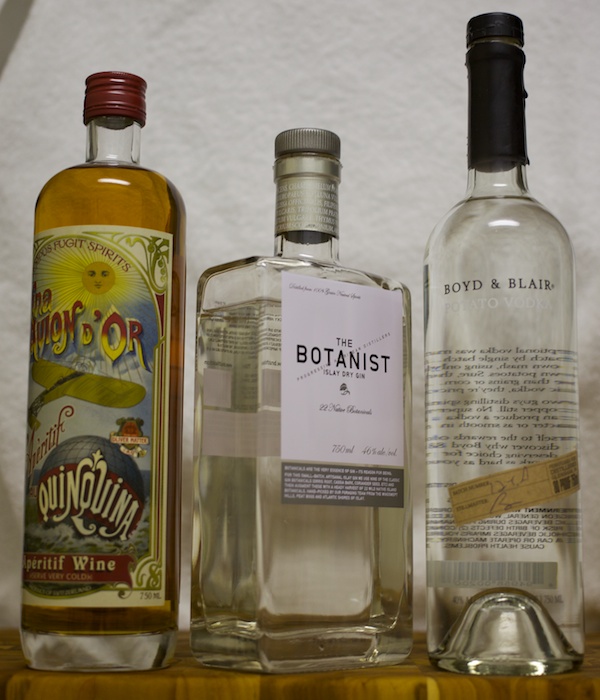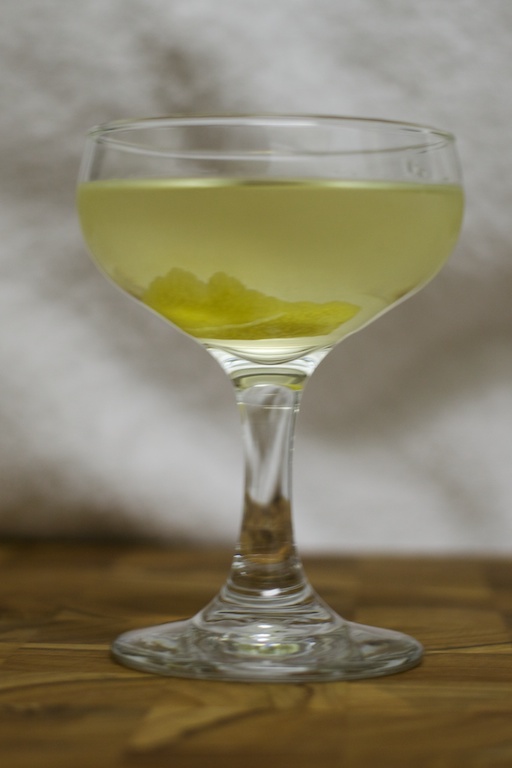one hundred cocktails
drinking with a purpose
← The Twentieth Century Cocktail | Vieux Carré Cocktail→
The Vesper
17 Aug 2012
If I wasn’t already having doubts about some of the directions Ted’s gone in this book, that he resorted to cocktails designed by a fictional character in a Flemming novel sure confirmed things!
This is the only cocktail in the book made with Lillet that specifically calls for Kina Lillet. This is interesting because every other such cocktail just ignores the fact that the modern formulation of Lillet Blanc is nothing like Lillet of days past! Kina Lillet, per se, was similar to Lillet Blanc but with an added bitter component (for fighting malaria, naturally). Now that malaria isn’t really a thing in the first world, they decided to make Lillet uninteresting too, and we all suffer in our mixology.
But alas. We need a starting point! For the first version of the drink, we start with a decent gin, one of the smoother milder vodkas, and good old Lillet Blanc.

The only reaction I got was “It’s kind of like a martini, but I’d rather have a martini.” I couldn’t really disagree. The exceptionally smooth vodka just thins out the gin flavor a little bit, and a splash of a slightly sweeter but less herbal “vermouth” just makes it a bit flat and cloying.
Meh.

It was time for shit to get real. Tempus Fugit, whose products are still woefully difficult to acquire either en masse or in completeness, has done what it does again! They have a bit of a tendency to take something, return it to its classic roots, and then turn it up to 11. So, it’s not authenticity per se, but it ends up getting at least to the point of being better, rather than inferior to, the original. This is what happened when they made their “Kina L’Avion D’Or” Vin Apertif au Quinquina. At $30, it’s not your grandparents’ Kina, but it’s probably better. See my article on Gran Classico for some bedtime reading of a similar form.
Add to that Bruichladdich’s The Botanist gin, and things start to get interesting. This is a gin distilled by an Islay Scotch distiller, which makes more sense than you might think. I’ve loved it lately because of its exceptional complexity and balance – this is not a juniper-forward pine-bomb of a gin, but it’s not mild and unobtrusive like, say, Plymouth. What I love about it is that it mixes absurdly well with herbal spirits and vermouths, without trying to over-assert its influence.
Finally, ultra-smooth vodka is pointless, except to dull the flavor and get one drunk. Instead I went for a fantastic potato vodka, which adds a nice richness and oily character to the drink. Boyd & Blair’s potato vodka achieves this effect, providing more than just a dilution of the base spirit! By itself this vodka is pretty impressive, though there’s enough strong flavors in this drink that it’s really adjusting the palate in a positive fashion, more than adding its own influence.
And, thus, the Vesper that was worth drinking:

The Vesper will probably never be a go-to drink for me, especially since few bars in the world would put the effort in to make it properly. It does, however, achieve a certain elegance and grace. As the drink warms the complexity increases. The balance is great, but not quite as harmonious as that of a martini – where the mixing ice makes a martini smooth and perfect, the Vesper is left a little on edge and disheveled. There’s a little more heat on the nose and some spice that hasn’t quite integrated.
This Vesper isn’t as easy to drink as a martini, but that’s not a bad thing.
As much as I like a good martini, a martini at its core is a strong drink that’s just a bit too simple. It’s good for unhooking the brain and getting wasted. This is the thinking drinker’s version of that sort of beverage. It’s still a stiff drink and not for the uninitiated, but it is an up drink for the contemplative and reflective.
Copyright © 2011 - 2012 Aaron N. Tubbs